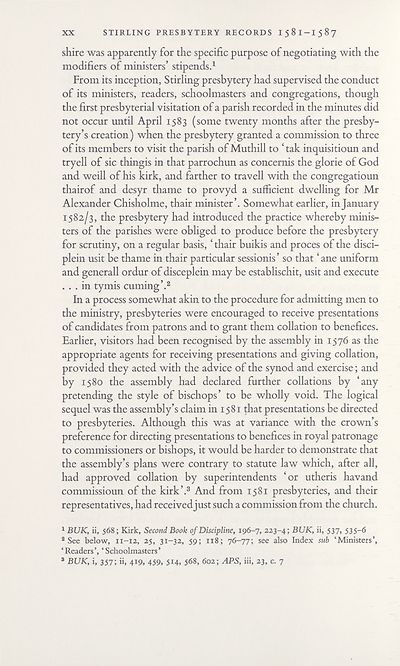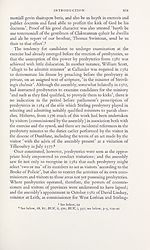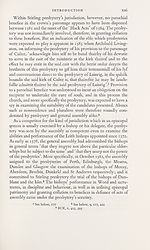Series 4 > Stirling Presbytery Records 1581-1587
(25) Page xx
Download files
Complete book:
Individual page:
Thumbnail gallery: Grid view | List view

XX STIRLING PRESBYTERY RECORDS I581-I587
shire was apparently for the specific purpose of negotiating with the
modifiers of ministers’ stipends.1
From its inception, Stirling presbytery had supervised the conduct
of its ministers, readers, schoolmasters and congregations, though
the first presbyterial visitation of a parish recorded in the minutes did
not occur until April 1583 (some twenty months after the presby¬
tery’s creation) when the presbytery granted a commission to three
of its members to visit the parish of Muthill to ‘ tak inquisitioun and
tryell of sic thingis in that parrochun as concemis the glorie of God
and weill of his kirk, and farther to travell with the congregatioun
thairof and desyr thame to provyd a sufficient dwelling for Mr
Alexander Chisholme, thair minister’. Somewhat earlier, in January
1582/3, the presbytery had introduced the practice whereby minis¬
ters of the parishes were obliged to produce before the presbytery
for scrutiny, on a regular basis, ‘ thair buikis and proces of the disci-
plein usit be thame in thair particular sessionis’ so that ‘ane uniform
and generall ordur of disceplein may be establischit, usit and execute
... in tymis cuming’.2
In a process somewhat akin to the procedure for admitting men to
the ministry, presbyteries were encouraged to receive presentations
of candidates from patrons and to grant them collation to benefices.
Earlier, visitors had been recognised by the assembly in 1576 as the
appropriate agents for receiving presentations and giving collation,
provided they acted with the advice of the synod and exercise; and
by 1580 the assembly had declared further collations by ‘any
pretending the style of bischops’ to be wholly void. The logical
sequel was the assembly’s claim in 1581 that presentations be directed
to presbyteries. Although this was at variance with the crown’s
preference for directing presentations to benefices in royal patronage
to commissioners or bishops, it would be harder to demonstrate that
the assembly’s plans were contrary to statute law which, after all,
had approved collation by superintendents ‘or utheris havand
commissioun of the kirk’.3 And from 1581 presbyteries, and their
representatives, had received just such a commission from the church.
1 BUK, ii, 568; Kirk, Second Book of Discipline, 196-7, 223-4; BUK, ii, 537, 535-6
2 See below, 11-12, 25, 31-32, 59; 118; 76-77; see also Index sub ‘Ministers’,
‘ Readers ’, ‘ Schoolmasters ’
2 BUK, i, 357; ii, 419, 459, 514, 568, 602; v4PS, iii, 23, c. 7
shire was apparently for the specific purpose of negotiating with the
modifiers of ministers’ stipends.1
From its inception, Stirling presbytery had supervised the conduct
of its ministers, readers, schoolmasters and congregations, though
the first presbyterial visitation of a parish recorded in the minutes did
not occur until April 1583 (some twenty months after the presby¬
tery’s creation) when the presbytery granted a commission to three
of its members to visit the parish of Muthill to ‘ tak inquisitioun and
tryell of sic thingis in that parrochun as concemis the glorie of God
and weill of his kirk, and farther to travell with the congregatioun
thairof and desyr thame to provyd a sufficient dwelling for Mr
Alexander Chisholme, thair minister’. Somewhat earlier, in January
1582/3, the presbytery had introduced the practice whereby minis¬
ters of the parishes were obliged to produce before the presbytery
for scrutiny, on a regular basis, ‘ thair buikis and proces of the disci-
plein usit be thame in thair particular sessionis’ so that ‘ane uniform
and generall ordur of disceplein may be establischit, usit and execute
... in tymis cuming’.2
In a process somewhat akin to the procedure for admitting men to
the ministry, presbyteries were encouraged to receive presentations
of candidates from patrons and to grant them collation to benefices.
Earlier, visitors had been recognised by the assembly in 1576 as the
appropriate agents for receiving presentations and giving collation,
provided they acted with the advice of the synod and exercise; and
by 1580 the assembly had declared further collations by ‘any
pretending the style of bischops’ to be wholly void. The logical
sequel was the assembly’s claim in 1581 that presentations be directed
to presbyteries. Although this was at variance with the crown’s
preference for directing presentations to benefices in royal patronage
to commissioners or bishops, it would be harder to demonstrate that
the assembly’s plans were contrary to statute law which, after all,
had approved collation by superintendents ‘or utheris havand
commissioun of the kirk’.3 And from 1581 presbyteries, and their
representatives, had received just such a commission from the church.
1 BUK, ii, 568; Kirk, Second Book of Discipline, 196-7, 223-4; BUK, ii, 537, 535-6
2 See below, 11-12, 25, 31-32, 59; 118; 76-77; see also Index sub ‘Ministers’,
‘ Readers ’, ‘ Schoolmasters ’
2 BUK, i, 357; ii, 419, 459, 514, 568, 602; v4PS, iii, 23, c. 7
Set display mode to:
![]() Universal Viewer |
Universal Viewer | ![]() Mirador |
Large image | Transcription
Mirador |
Large image | Transcription
Images and transcriptions on this page, including medium image downloads, may be used under the Creative Commons Attribution 4.0 International Licence unless otherwise stated. ![]()
| Scottish History Society volumes > Series 4 > Stirling Presbytery Records 1581-1587 > (25) Page xx |
|---|
| Permanent URL | https://digital.nls.uk/126646455 |
|---|
| Description | Over 180 volumes, published by the Scottish History Society, containing original sources on Scotland's history and people. With a wide range of subjects, the books collectively cover all periods from the 12th to 20th centuries, and reflect changing trends in Scottish history. Sources are accompanied by scholarly interpretation, references and bibliographies. Volumes are usually published annually, and more digitised volumes will be added as they become available. |
|---|


